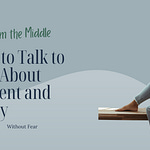🎧 Listen here on Apple Podcasts
There’s a show on Netflix that I’m seeing everywhere right now - Adolescence. As a former school counselor who has worked with tweens and teens for over a decade, I had to check it out. While the show is fictional (and intense - there is a traumatic crime that takes place), it felt incredibly real in the way it highlighted the quiet and not-so-quiet challenges kids today are navigating.
What struck me most, though, is how people seem to be pointing fingers after watching. One article blames tech. Another blames parents. Someone else blames the school system. But what I appreciated most was an interview with the actor who plays the dad (who also produced the show), where he said the point of the show was to show how everyone plays a role. That everyone is accountable for the well-being of kids today.
As someone who works with both parents and educators, that resonated. And so today, I’m sharing 11 quick takeaways from the show that felt so relevant to real life - especially if you’re raising or working with boys.
1. Technology is Constant
From classroom scenes to dinner tables, kids in the show are glued to their devices. And it mirrors what I see in real life, especially for middle schoolers. The overstimulation, the constant dopamine hits, the decrease in face-to-face connection - it’s all impacting attention, regulation, and mental health.
2. The School System is Overwhelmed
Yes, the classrooms in the show are extreme (video watching 24/7), but the burnout? The behavioral issues? The disciplinary exhaustion? That part - very real. Especially when it comes to emotional dysregulation that educators aren't trained to support. In fact, a 2022 study showed only 30% of teachers felt equipped to address student mental health needs.
3. Adults Aren’t Listening
In scene after scene, adults in the show ask kids questions only to cut them off or redirect them right away. Even well-meaning adults (like a teacher trying to help a crying student) end up shutting down the moment by referring the student out instead of staying present. Our kids need listeners, not fixers.
4. Boys, Masculinity, and Anger
This show highlights just how lost some boys are. They’re angry, disconnected, unsure of how to express themselves. And often, the adults around them are modeling the same repression of feelings. If boys don’t see emotional intelligence from the men in their lives, they turn to the internet to figure it out - which opens the door to toxic messaging and online rabbit holes.
5. Kids Are Numb to Mature Content
In one powerful scene, a psychologist tries to talk to Jamie about his social media use, and he’s stunned she’s even asking. No adult has talked to him about it before. Today’s kids are constantly exposed to mature, explicit, and often disturbing content online. But they rarely get context, conversation, or guidance from the adults in their lives.
6. We Can’t Avoid Hard Conversations
Middle schoolers (and even elementary kids) are already navigating big topics: social media, sexuality, relationships, body image. When adults avoid these topics because they’re uncomfortable, kids are left to learn from TikTok and their friends. That’s not who we want teaching them.
7. Boys Are Begging to Feel Seen
In one heartbreaking scene, Jamie yells, "Do you like me? Do you think I’m a good person?" to the psychologist. Boys are told to be tough, not talk about emotions, and keep it together. But under that, they are craving validation and belonging. They want to be loved for who they are, not what they do.
8. Phones Have Robbed Kids of Impulsive Joy
There’s a scene where Jamie’s parents reminisce about high school and a silly, spontaneous moment at a dance. And it hit me - our kids are losing those moments. They’re so often curating their lives or consuming someone else’s, that the carefree fun we had growing up is slipping away.
Watch or listen to the podcast episode to hear takeaways 9, 10, and 11. What can I say - it was hard to narrow it down!
The show is heavy, and I’d caution anyone who’s deep in the trenches of parenting not to watch it unless you feel ready. But the messages? They’re important.
If you’re a paid subscriber, I’ll be back in your inbox later this week with Part 2: my top 7 tangible, doable strategies for supporting our kids (and ourselves) in this digital age.
And if you haven’t yet, consider becoming a paid subscriber so you don’t miss those follow-up tools.
With you, Ashley
A Few Notes from Me: If you're raising or supporting boys, you are not alone. This cultural moment is telling us something, and it deserves our attention. You don't have to have all the answers. But if you're here, you're already doing the work.
Let's keep the conversation going - respond directly to this post and let me know what resonated or surprised you.












Share this post